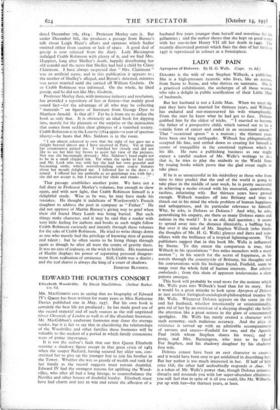LADY OF PAIN
Apropros of Dolores. By H. G. Wells. (Cape. 7s. 6d.)
DOLORES is the wife of one Stephen Wilbeck, a publisher. She is a high-pressure neurotic who lives, like an actress, from Scene to Scene, and who thrives on tantrums. She is a practised exhibitionist, the archetype of all those women who take a delight in public scarification of their Little Men of husbands.
But her husband is not a Little Man. When we meet the pair they have been married for thirteen years, and Wilbeck has endured and out-manoeuvred his wife triumphantly. From the start he knew what he had got to face. Dolores grabbed him by the oldest of tricks. " I married to become the father of a prospective child, which turned out to be a volatile form of cancer and ended in an occasional spasm." That " occasional spasm " is a meiosis ; the thirtedn years have been one long earthquake. Wilbeck has phlegmatically accepted his fate, and settled down to creating for himself a centre of tranquillity in the emotional typhoon which is his life. He runs a publishing business as one might expect a careful student of Mr. Wells's writings to do ; that is, he tries to play the midwife to the World State by issuing books which prove that the glad event ought to take place.
If he is as unsuccessful in his midwifery as those who from time to time predict that the end of the world is going to take place in the middle of next week, he is pretty successful in achieving a modus vivendi with his mercurial, quarrelsome, tactless, infuriating wife. But thirteen years have proved enough. Wilbeck wanders off into Brittany and tries to thrash out in his mind the whole problem of human happiness and unhappiness, and its particular relevance to himself. Why, he asks, is Dolores so Dolores ? And why, he asks, generalising his enquiry, are there so many Dolores states and nations in the world ? It is an old, dull question ; it seems to spread away into the distance illimitably, a baffling bog. But over it the mind of Mr. Stephen Wilbeck (who thinks the thoughts of Mr. H. G. Wells) glances and darts and scin- tillates with the brilliance of 'a tropical lightning-storm. The publishers suggest that in this book Mr. Wells is influenced by Sterne. To this extent the comparison is true, that Wilbeck in his speculations " five miles meanders with a mazy motion " ; in his search for the secret of happiness, as he travels through the countryside of Brittany, his thoughts and his conversations with his biologist friend, Foxfield, seem to range over the whole field of human interests. But solvitur ambulando ; from this skein of apparent irrelevancies a clear pattern emerges.
This book will probably be read more for the notions which Mr. Wells puts into Wilbeck's head than for its story. But it would be a great mistake to look upon Apropros of Dolores as just another biological-sociological-philosophical treatise by Mr. Wells. Whenever Dolores appears on the scene (in the end her husband, whether intentionally or unintentionally, gets rid of her by an overdose of a sleeping draught) she holds the attention like a great actress in the glare of concentrated spotlights. Mr. Wells has rarely • created a character with such economy, such malicious accuracy. And the piece de resistance is served up with an admirable accompaniment of savours and sauces—Foxfield for one, and the Apostle Paul (with whom Stephen shares his woes), and a pony, and Mrs. Bunnington, who tries to be Good For Stephen, and his shadowy daughter by his shadowy first wife.
Dolores cannot have been an easy character to create ; and it would have been easy to get acidulated in describing her. But her author is too much interested in her. If half of him cries Odi, the other half undoubtedly responds et Amo. It is a token of Mr. Wells's power that, though Dolores irritates, disturbs and astounds you with her super-abundant elfishness, you still feel that in spite of it all you could, like Mr. Wilbeck, put up with her—for thirteen years, at least.


















































 Previous page
Previous page